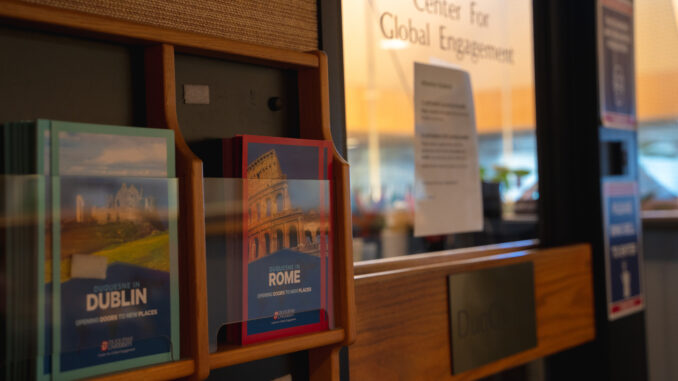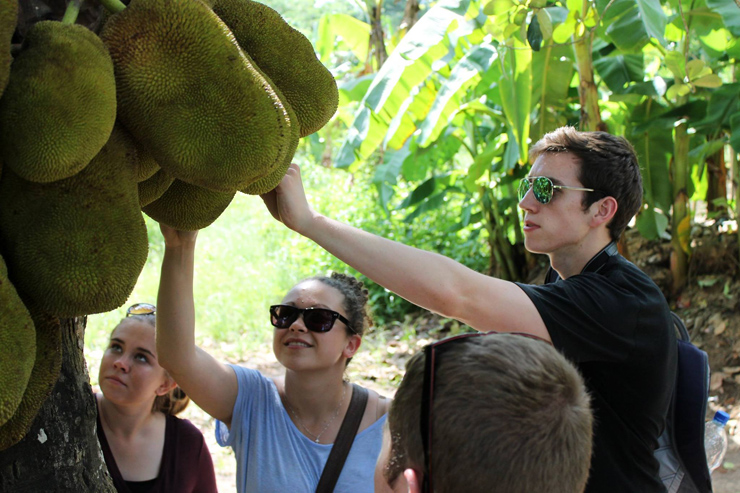
Elizabeth Sharp | staff writer
03/04/2021
This summer, the Center for Global and Cultural Engagement will be opening a new program to students who were unable to study abroad during the fall 2020 and spring 2021 semesters.
The “Junemester” is similar to the usual “Maymester,” but will occur a month later due to COVID-19 restrictions and to ensure the safety of students. The university had previously shut down fall and spring semesters abroad due to a ban on international travel, and to keep students and staff safe.
The pandemic impacted most aspects of study abroad programs, so it seemed a simpler choice to move many Maymesters to the spring of 2022. Duquesne usually boasts over 30 summer study abroad programs. However, many usual summer programs will not be occurring in 2021 due to the pandemic.
As of Feb. 26, the Dublin Junemester was canceled due to Ireland’s COVID-19 restrictions.
However, Junemesters in Rome and Belize are still currently scheduled between June 1 and July 11, 2021. The first two weeks of classes will be completed through online instruction to prepare students for their experience abroad while also ensuring all COVID-19 protocols are followed.
It is Duquesne’s 20th year on their Italian campus in Rome.
“Partnerships there are very strong,” said Danielle Genemore, associate director in the study abroad office at Duquesne.
Because of this, the Center of Global and Cultural Engagement has been working closely with this campus in order to ensure a safe Junemester and upcoming Fall 2021 semester abroad.
Joe DeCrosta, the executive director and senior international officer at Duquesne at the Center for Global Engagement, also explained more of the situation in Italy.
“There is good news coming out of Italy. The staff on that campus is already getting vaccinated … we plan to have students there for the fall 2021 semester,” DeCrosta said. The vaccination rollout is being monitored closely in order to ensure the safety of these programs going forward.
In order to keep students safe and healthy, the Center for Global and Cultural Engagement is following the COVID-19 situation in each country as they try to ensure that students are still getting an international experience as part of their college curriculum. DeCrosta described a “shift in the paradigm” as he predicts the program structure may evolve in many positive ways moving forward.
The Center for Global and Cultural Engagement has discovered new ways of offering instruction and has been able to overcome challenges during the pandemic.
“We have learned lessons from this crisis, and students should feel confident and safe about choosing to go abroad in the future,” DeCrosta said.
As of now, fall semester study abroad plans are still moving forward as DeCrosta and Genemore are both hopeful that the international COVID-19 situation will improve as vaccination rollout continues globally.
“It is a constant moving discussion as we plan for the fall. Staff abroad is confident that things will be different by the end of summer,” Genemore said.
The pair remain optimistic as many students look for that opportunity of international study as a key part of their college experience in the future.
“Our job is to give students global education and gain cultural competencies,” Genemore said.
“We are excited about the future of the program and are already seeing much interest [from students],” DeCrosta said.
The Center for Global and Cultural Engagement is following updates coming out of all its locations abroad. The center has had to make tough decisions this past year that vary from program to program due to how the U.S. and each host country has responded to the pandemic. They are also working with other Pittsburgh area universities and other professional organizations around the globe, and take under advisement how other students and universities plan to operate their study abroad programs moving forward.




